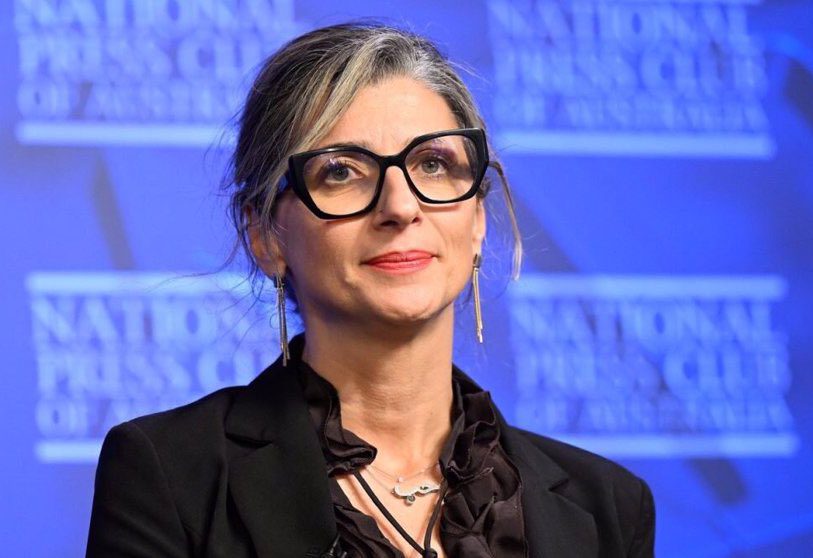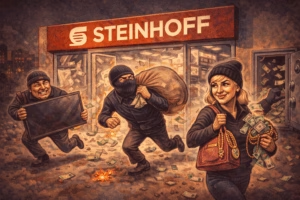The United States’ unprecedented decision to impose sanctions on Francesca Albanese, the United Nations Special Rapporteur on the situation of human rights in the occupied Palestinian territories, has sparked international legal debate and growing calls for intervention by the International Court of Justice (ICJ). Albanese, an Italian legal scholar, is the first UN mandate holder in history to be targeted by sanctions from a UN member state.
“Of course it’s going to affect me … It does matter to me and to my family. And we will hold; we will make sacrifices.”
“We will do everything that it takes. We will continue to do what we do to stand against the genocide.”
Her sanctioning—prompted by her extensive reporting on alleged Israeli and US human rights violations—has raised serious concerns over violations of international law and the diplomatic immunity granted to UN experts.
“I truly hope that people understand what’s happening.”
“I’m a UN pro bono official — I’m not even paid. Yet suddenly I’m a threat to the global economy. Why? Because I asked big tech to comply with international law and stop profiteering from genocide.”
— Francesca Albanese pic.twitter.com/qxEUESzbUC
— sarah (@sahouraxo) July 10, 2025
Francesca Albanese Legal Immunity and the 1946 Convention
UN special rapporteurs, although independent, are covered by the 1946 Convention on the Privileges and Immunities of the United Nations. The treaty, to which the United States is a party, explicitly provides immunity from “legal process of any kind” for all acts performed in an official capacity.
Professor Sergey Vasiliev, an international law scholar at the Open University in the Netherlands, emphasised that the sanctions imposed on Albanese fall directly within the scope of prohibited legal action under the Convention.
“As an independent UN expert, Albanese is being persecuted by the US government exactly for words spoken and written in that capacity.”
“Any UN member that takes issue with the US’ coercive measure could express protest and work towards framing it as a dispute on interpretation or application, with a view to bringing a case against the US to the ICJ.”
The ICJ has limited jurisdiction over disputes involving the United States unless Washington consents. However, the United Nations General Assembly or another authorised UN body may seek an advisory opinion from the court—an option increasingly being explored by legal experts and UN officials.
“There is clearly a difference between the UN and the US arising out of the interpretation or application of the Convention. If these exhortations fail – which they likely will – the UN officials concerned should look into how the ICJ could be seized of this matter.”
UN’s Response: Measured Condemnation, No Concrete Action
UN Secretary-General António Guterres, through his spokesperson Stephane Dujarric, labelled the US move as “unacceptable,” but has not yet detailed any steps to safeguard Albanese or uphold the principles of the Convention.
“Unacceptable”
“A dangerous precedent”
UN High Commissioner for Human Rights Volker Türk and President of the UN Human Rights Council Jürg Lauber have echoed the condemnation and called for the sanctions to be rescinded. Yet, the lack of a concrete legal strategy to challenge the move has left human rights advocates increasingly uneasy.
Professor Balakrishnan Rajagopal, UN Special Rapporteur on the right to adequate housing, stated that the UN must go beyond statements of disapproval.
“Legally, the UN must take a clear stand that all rapporteurs enjoy immunity from all legal processes and must be facilitated to discharge their responsibilities during their term, including their right to attend relevant UN General Assembly sessions in New York.”
“The UN must also be prepared to legally defend the rights of rapporteurs before relevant international courts such as the ICJ.”
Past ICJ Rulings on Rapporteur Immunity
The notion of diplomatic immunity for UN experts is not new, and precedent strongly supports their protection. In 1999, the ICJ issued an advisory opinion affirming that Dato’ Param Cumaraswamy, then UN Special Rapporteur on the Independence of Judges and Lawyers, was entitled to immunity from legal proceedings initiated in Malaysian courts following a critical interview.
“The ICJ instructed the government of Malaysia to inform its courts accordingly, so that its international obligations could be given effect.”
That case has become a cornerstone for interpreting the UN’s legal shield for its appointed experts and is now being invoked in support of Albanese.
Growing International Pressure on the US and UN
Ben Saul, UN Special Rapporteur on counterterrorism and human rights, stressed that the Secretary-General or General Assembly could escalate the issue by referring it to the ICJ.
“The UN Secretary-General [Antonio Guterres] could protest such violations to the US directly to attempt to have them removed, or the UN General Assembly could request an advisory opinion from the ICJ.”
Agnes Callamard, Secretary General of Amnesty International and a former UN Special Rapporteur herself, urged the European Union and Italy—Albanese’s home country—to take a firm public stand. She warned against relying solely on the UN bureaucracy to shield its own officials.
“I think what is more likely to have an impact is other governments, including Albanese’s own government [Italy] and the EU to take a very strong stand against the sanctions.”
“But we cannot let the UN off the hook, and we do need to demand that it responds to the attack.”
A First in UN History: Sanctioning a Rapporteur
While UN special rapporteurs have previously faced threats, smear campaigns, and restrictions, including being declared persona non grata, Albanese is the first to be officially sanctioned. This escalation represents an unprecedented form of retaliation, raising concerns over whether rapporteurs can perform their duties without interference or coercion.
Appointed by the Geneva-based UN Human Rights Council, special rapporteurs operate independently, often critiquing powerful nations. Albanese’s recent work has been especially damning. Her 30 June report identified dozens of international firms she claims have contributed to the development of what she described as Israel’s “economy of genocide.”
The report encouraged the ICC and national courts to investigate and, if warranted, prosecute executives and entities linked to these activities. It also called on governments to implement sanctions and asset freezes.
“The transformation of Israel’s economy of occupation to an economy of genocide”
“The report called on the International Criminal Court (ICC) and national judicial systems to investigate and prosecute corporate executives and companies. It also called on UN member states to pursue sanctions and asset freezes.”
The Sanctions
According to the announcement, the sanctions will result in the freezing of Albanese’s US-based assets and likely restrict her from entering or transacting in the United States. If extended through coordinated action with allies, such as the European Union, the sanctions could seriously impede her financial and professional activities globally.
Albanese’s resilience in the face of mounting pressure has earned her admiration from human rights advocates, but the broader concern remains: how can international law function effectively when a powerful state disregards established legal norms?
UN Immunities Under Threat
The Albanese case is not an isolated development. The ICJ is currently reviewing a dispute initiated after Israel banned the United Nations Relief and Works Agency for Palestine Refugees in the Near East (UNRWA) in October, prompting accusations of violations against the founding UN Charter and the immunities granted to its agencies.
This broader legal confrontation reinforces growing anxieties about the erosion of multilateral institutions and the safety of individuals serving within them.

















